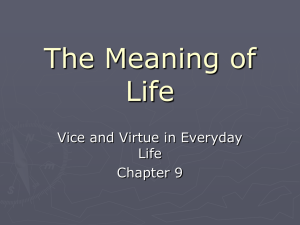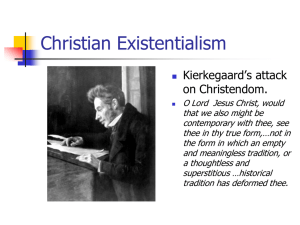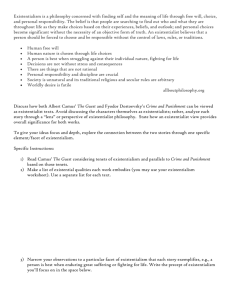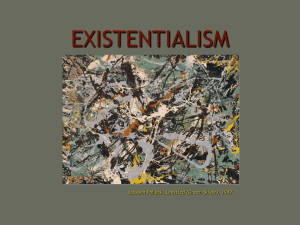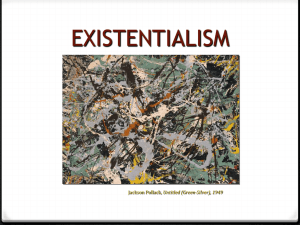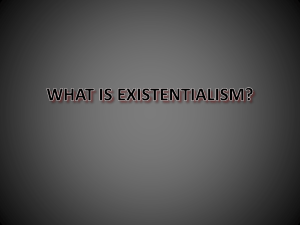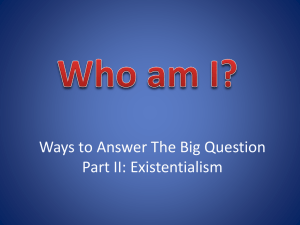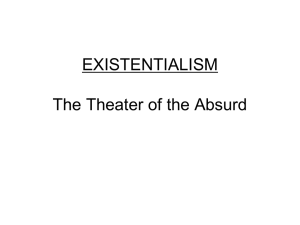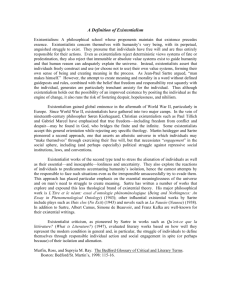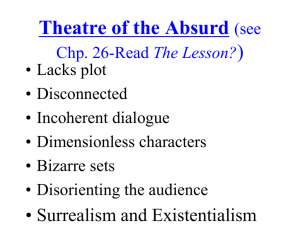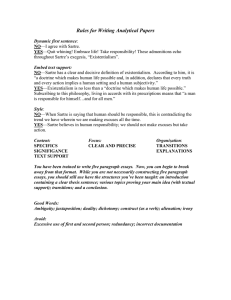Existentialism &the Absurd
advertisement
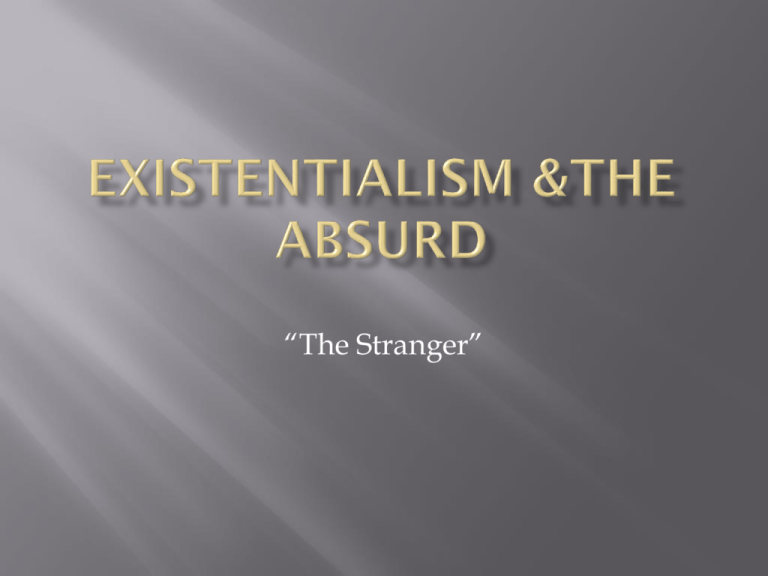
“The Stranger” “a chiefly 20th century philosophical movement embracing diverse doctrines but centering on analysis of individual existence in an unfathomable universe and the plight of the individual who must assume ultimate responsibility for acts of free will without any certain knowledge of what is right or wrong or good or bad” “Existence precedes essence” –Kierkegaard Individual personalities are molded through confrontations of reality and choices made The identity of one person cannot be found by examining what other people are like, but only through what that person has done Focuses on free will and personal responsibility Human nature is decided through life choices, not by the ways of society Worldly desire is futile Existentialism is the questioning of what the ultimate purpose of life is There is no universal right or wrong in the world (“bad things happen to good people” and viceversa); since there is no logic to this, existentialists are led to believe that life in the world we live in is meaningless There is no such thing as fate or destiny; man must make his own way Existentialists are realists who accept the meaninglessness of life and strive to give their life a meaning of its own (creating their own purpose in life) "Man is condemned to be free; because once thrown into the world, he is responsible for everything he does.“ –Jean Paul Sartre Most popular in France during WWII: The oppressive government system under the Nazis and the need for resistance provided the perfect background for Existentialism’s focus on individual action and responsibility However, the existentialist movement began much earlier (Nietzsche proclaimed “God is dead” in the 1880s) It led to the composition of literary works that discussed ideas of loneliness, isolation, and a fear of the uncaring universe Heidegger – Choices and resulting actions define the self; each choice is a pivotal point in one’s life, each contributing to the larger definition of self (no matter how trivial the choice may be); an individual thinks about a creation and its purpose before it exists Nietzsche – Proclaimed “God is dead,” so men should use their dominance; idea that men must accept fact that they’re part of a material world, no matter what else might exist; must live as if there’s nothing else beyond life; failure to live & take risks = failure to realize human potential Nihilism- complete disregard for all things that cannot be proven or demonstrated scientifically Hegel – (Not an existentialist, but his ideas paved the way for existential theology) Believed that if the ends are noble, the means are justified; a man can do whatever it takes to prove a point if it is going to advance civilization Martin Buber – Faith was about personal commitments to the Creator; having faith means actively defining yourself (engaging in acts of faith); this resembles the active self-definition ideas that surround existentialism; Buber also questioned whether science failed to help humanity find meaning Soren Kierkegaard – Father of Christian Existentialism, said “I believe, therefore I am,” and believes that we live merely for the sake of living; life is subjective and ambiguous; must live in truth before God to achieve full unity of purpose Gabriel Marcel – Offered possibility of “communion,” where two people can understand each other’s subjectivity, or free will; a human thinker eager to act and learn for themselves cannot exist in a technologically advancing, scientific world Camus’ definition: when a person’s “consciousness,” longing for order, collides with “the other’s” lack of order, a third element is born – absurdity. It is basically the conflict between the natural human desire to seek meaning in life and the inability to find it; this is an impossible feat, therefore making it quite “absurd” Unlike existentialism, an absurdist believes there may be meaning, but humans will never know it. Emphasizes certainty of death Sartre – famous existentialist; spoke on the absurd, saying that “the absurdity of human existence is the necessary result of our attempts to live a life of meaning and purpose in an indifferent, uncaring universe” The Absurd Hero: The Myth of Sisyphus (we’ll read this later in the week) Rejects the supernatural Believes life has value Considers death to be the most contradictory part of life

